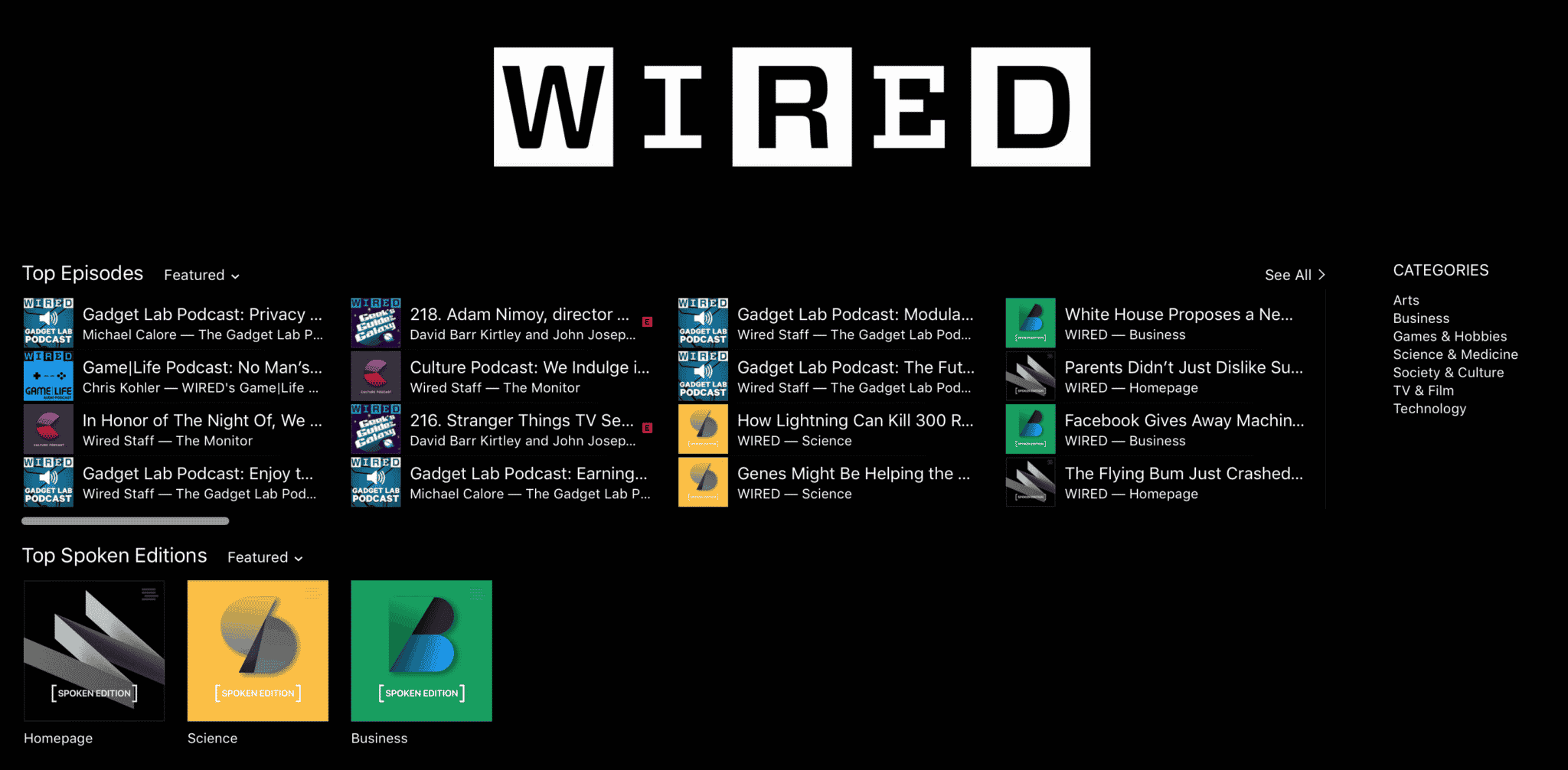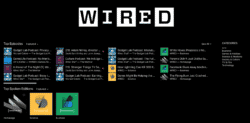Apple Gets Serious About Podcasts


This has kept the format as a source of entertainment rather than news/information, but a recent discovery in iTunes suggests Apple is going to change that around.
Techcrunch reports that they found evidence of a a new category of podcasts in iTunes:
If you prefer listening to the news over reading the news, you’ll soon have a new way to do so, via iTunes. In the near future, you’ll be able to browse through a variety of podcasts focused on turning media publishers’ articles and news into audio content, dubbed “Spoken Editions.”
On iTunes, podcasts branded “Spoken Edition” will be short-form programs that offer listeners an audio version of the publisher’s written content. That means you could “read” your favorite website or hear the news when you’re doing other things — like walking your dog, commuting to work or working out at the gym, for example.
During early tests on iTunes, Spoken Editions for several media brands showed up.
Wired, for example, will launch Spoken Editions for “Business,” “Science” and its homepage. TIME will offer a Spoken Edition called “The Brief.” Forbes, .Mic, Bustle, Playboy, OZY, and — yep — TechCrunch (which I discovered while browsing our iTunes page, of all things) will have Spoken Editions, it seems, as all popped up for a time on iTunes.
The links to all the publishers’ Spoken Editions have since been pulled, after our discovery and outreach.
The podcasts are apparently the work of Spoken Layer, a startup which supplies web publishers with the tech, talent, and distribution needed for making a large volume of podcasts.
The company wouldn’t talk about the iTunes leak, but they did talk about their services in general.
“We have a distributed network of voice-over talent that is tagged and managed,” explains SpokenLayer CEO Will Mayo, who declined to talk about Spoken Editions in particular, but spoke more broadly about his company and technology works. That way, he says, stories sound different from one publisher to the next. “We make sure Wired sounds like Wired and any other publication sounds like those publications. The voice and style of any brand is in its writers and the reporting it does. That’s unique for every publication, and that uniqueness is honored,” adds Mayo.
Podcasts have been around for over a decade, but in the past couple years they have come into their own.
Amazon, for example, acquired Rooftop Media in late 2014 and then used the used the audio distributor to build Audible Channels, a new podcasting section of Audible which launched in July 2016. Overseen by all the public radio talent Amazon recruited in 2015, Audible Channels is a $5 a month subscription service (free to Prime members and Audible subscribers) with nothing but podcasts – although Amazon isn’t calling them that.
There’s no word yet on how Apple will charge for the podcasts. Current industry trends suggest Apple will charge a subscription (a la Apple Music) but the podcasts can also have ads, so they could be free.
In either case, Techcrunch reports that Spoken Editions will roll out in early October.
We will know more then.


Comments
Martha September 24, 2016 um 3:17 pm
If Apple wants to do more with podcasts, it needs to get serious about fixing iTunes. Granted, I am a Luddite who prefers to listen to podcasts on my iPod classic rather than my smartphone, which is smaller, less delicate, provides longer battery life and can be operated without my looking at it. But using the bloated, prone-to freeze iTunes software has become a hideous experience. iTunes is especially bad for podcasts because it is hard to manage them–I keep experimenting with the settings but have not found a good way to reliably delete those podcasts I don’t want to keep while saving those podcasts I do want to keep.
The only reason I haven’t switched away is that I can’t find any alternatives that would work with my iPod. (All I want are smart playlists plus podcast catching, so if anyone knows of something, please let me know!)
Martha September 24, 2016 um 3:18 pm
err, bad edit above–it’s the ipod classic that is smaller, less delicate, etc. not my smartphone, obv
Nate Hoffelder September 24, 2016 um 3:23 pm
The iTunes app is crap, yes.
Nat September 26, 2016 um 9:43 am
IMHO, the iOS Podcasts app is far worse than iTunes. And the syncing between them, as Martha said, is craptastic. It’s bad enough that I’ve chosen to have one library in iTunes (mostly for archiving) and a completely separate library in Downcast on my phone, and manually correlate them, because it’s less effort than trying to beat the iTunes/Podcasts combo into compliance. The whole thing seems to be built on the twin assumptions that (1) you will never want to keep a podcast after you listen to it and (2) you will never have more podcasts at a given time than fit on your iOS device.
Neither of those facts are true for me. And contrary to Nate’s assertion, podcasts are already a great way to get news and information. While a couple of the podcasts I regularly listen to are basically entertainment (they’re pop culture/sociological analysis), podcasts are how I get most of my news: Marketplace, All Things Considered, On the Media and many other news podcasts are excellent. Similarly, Science Friday, Stuff You Should Know, and a whole host of other educational podcasts exist.
Spoken Editions, czyli pomys? Apple na s?uchanie tekstów w Sieci September 28, 2016 um 5:32 am
[…] ostatnim tygodniu pojawi?y si? doniesienia o nowej kategorii podcastów w iTunes – Spoken Editions. Okazuje si?, i? Spoken Editions […]